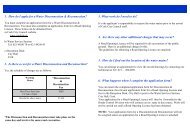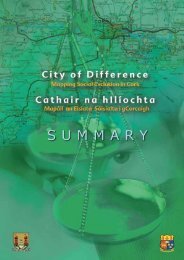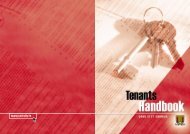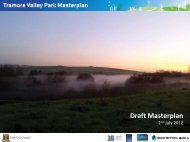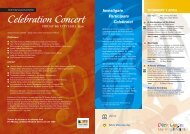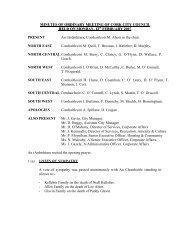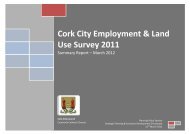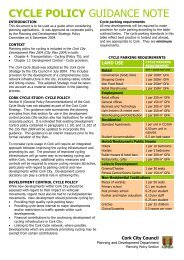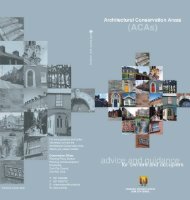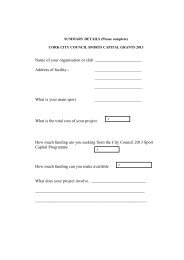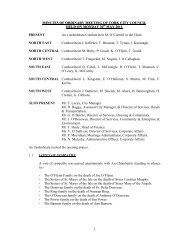Employment - Cork City Council
Employment - Cork City Council
Employment - Cork City Council
Create successful ePaper yourself
Turn your PDF publications into a flip-book with our unique Google optimized e-Paper software.
<strong>Employment</strong><br />
The rules governing who can work<br />
freely in Ireland and who needs<br />
permission (a permit, visa or<br />
authorisation) are complicated. We<br />
have tried to give a general overview of<br />
the current situation but cannot cover<br />
all cases.<br />
Work Permits<br />
Many people are free to work without a<br />
work permit, including:<br />
● Citizens of a European Economic<br />
Area (EEA) country (the EU<br />
countries plus Norway, Iceland,<br />
Liechtenstein) and Switzerland.<br />
● Persons who have been granted<br />
refugee status.<br />
● Students (for up to 20 hours per<br />
week in term time, full time in<br />
holidays.<br />
● Non-EEA workers legally employed<br />
in one Member State who are<br />
temporarily sent on a contract to<br />
another Member State.<br />
● Persons who have been granted<br />
permission to remain in Ireland<br />
because:<br />
- They are the spouse or parent of<br />
an Irish citizen.<br />
- They have been given temporary<br />
leave to remain on humanitarian<br />
grounds, having been in the Asylum<br />
process.<br />
If you need a work permit the key point<br />
to note is that it may only be applied<br />
for by an employer on behalf of a<br />
prospective employee. The employer<br />
must have a permit before the<br />
employee starts work. Working without<br />
a valid work permit is an offence under<br />
Irish law. If you have a work permit it is<br />
possible to change employers, but only<br />
if the new employer gets a work permit<br />
on your behalf. The existing work<br />
permit needs to be returned to the<br />
Department with a cover letter from<br />
the previous employer.<br />
An employer will pay between €65 and<br />
€500 for a permit, depending on its<br />
length. A permit can last for up to one<br />
year. Applications for renewal of<br />
permits should be made before the end<br />
of the current permit. The standard<br />
waiting time is 8-10 weeks but it may<br />
take longer depending on the number<br />
of applications.<br />
11
A NEWCOMER’S GUIDE TO CORK CITY<br />
Working Visas and<br />
Work Authorisation<br />
Because of skills shortages in certain<br />
sectors in Ireland, it is possible to<br />
apply for a working visa or work<br />
authorisation. Applications must be<br />
made from outside Ireland and the<br />
person applying must have an offer<br />
and contract of employment from an<br />
employer in Ireland in one of the<br />
named sectors (such as health care,<br />
information technology, construction<br />
engineering and town planning). The<br />
key difference between these and<br />
work permits is that working<br />
visas/work authorisation are granted<br />
initially for 2 years and the person<br />
may change employer (provided that<br />
they stay in the same sector).<br />
Further Information<br />
For the latest information and<br />
application forms contact:<br />
Department of Enterprise,<br />
Trade and <strong>Employment</strong>,<br />
Davitt House, 65a Adelaide Road,<br />
Dublin 2. www.entemp.ie<br />
Work permits section<br />
Tel. 01 6313333/3308<br />
email. workpermits@entemp.ie<br />
Working visas tel. 01 6313186<br />
email. workingvisas@entemp.ie<br />
Finding a Job<br />
There are several useful sources<br />
when you are looking for a job in<br />
<strong>Cork</strong>. Firstly, jobs are advertised in<br />
newspapers. The Friday edition of the<br />
Irish Times and Irish Examiner and the<br />
Thursday edition of the Irish<br />
Independent include many job ads.<br />
Jobs advertised in these national<br />
newspapers may be based anywhere<br />
in Ireland. The <strong>Cork</strong>-based Evening<br />
Echo includes job ads every day and<br />
these are usually for positions in <strong>Cork</strong>.<br />
Jobs are also advertised in the FÁS<br />
offices and local employment service<br />
(see page 14)<br />
Contact Details<br />
FÁS <strong>Employment</strong> Services Office,<br />
Sullivan’s Quay, <strong>Cork</strong>.<br />
Tel: 021 4856200 and in the FAS<br />
Centre, 30/31 Shandon Street,<br />
<strong>Cork</strong>. Tel: 021 4946162.<br />
<strong>Cork</strong> also has several recruitment<br />
agencies (a full listing is included in<br />
the Golden Pages under “Recruitment<br />
Specialists”). Many recruitment<br />
agencies are accessible online –<br />
these include: www.irishjobs.ie,<br />
www.bestjobs.ie<br />
www.recruitireland.com,<br />
www.jobsireland.com,<br />
www.topjobs.ie and www.monster.ie<br />
EMPLOYMENT<br />
3<br />
12
How to Apply for a Job<br />
Once you’ve found a job ad that<br />
interests you and seems to match<br />
your skills, the next step is to apply<br />
for the position. The job ad will tell<br />
you how to apply – this usually<br />
involves sending an application letter<br />
and curriculum vitae (see below) by a<br />
specific date. It’s important not to<br />
miss that date, as late applications<br />
are not usually considered. The<br />
employer may want you to apply<br />
using an application form, which is<br />
generally mentioned in the ad and<br />
available from the employer.<br />
Curriculum Vitae (CV)<br />
A CV (curriculum vitae) gives a brief<br />
overview of your education and work<br />
experience and seeks to show the<br />
employer why you are suitable for the<br />
job. A CV will include:<br />
● Personal details (name, age,<br />
contact details, etc)<br />
● Education details<br />
● Work experience and employment<br />
history.<br />
● Interests and activities.<br />
● Additional information such as<br />
ability with foreign languages,<br />
computing skills, etc.<br />
● Names and addresses of people<br />
who will give you a reference<br />
(usually past employers).<br />
The layout of a CV is important. It<br />
should be easy to read, clear and<br />
concise (1-2 pages at most). As space<br />
is limited you should adapt your CV to<br />
match the specific requirements of<br />
each job you are applying for. CV<br />
samples can be obtained from the<br />
Internet (e.g. www.ucc.ie/careers) and<br />
from recruitment agencies.<br />
What is a Cover Letter<br />
When applying for a job always send<br />
a cover letter along with your<br />
application or CV. Begin the letter<br />
with “Dear Sir/Madam” if you don’t<br />
know the surname. End with “Yours<br />
sincerely”.<br />
Start by indicating the job you are<br />
applying for and where you learned<br />
about the vacancy. Go on to say why<br />
you are interested in this job. Mention<br />
your relevant qualifications and<br />
related work experience. Finally,<br />
indicate your availability for interview<br />
and if necessary ask for further<br />
information.<br />
The Interview<br />
The employer will invite applicants<br />
who seem best suited for the job to<br />
an interview. If you are called for an<br />
interview you should prepare well.<br />
Find out if there is any aptitude<br />
(ability, skill) test included in the<br />
interview. Know the organisation and<br />
the job. Think about your strengths<br />
and weaknesses. Allow enough time<br />
to arrive 20 to 30 minutes early. Dress<br />
professionally and give a firm<br />
handshake. Listen to the questions<br />
carefully and answer clearly and<br />
concisely. If you don’t understand a<br />
question ask for clarification. If you<br />
don’t know the answer to a question<br />
13
A NEWCOMER’S GUIDE TO CORK CITY<br />
say so. When given the opportunity to<br />
ask questions, it is the right time to<br />
demonstrate what you know about<br />
the company. Leave on a positive<br />
note.<br />
Support in Finding Work<br />
There are a number of organisations<br />
which provide support, free of charge,<br />
to people looking for work (provided<br />
that they are eligible to work in<br />
Ireland). FÁS provides a range of<br />
services to help people find work,<br />
including career guidance and<br />
information on jobs and training<br />
opportunities. The first step is to<br />
register at your local FÁS Office<br />
(Contact details page 12).<br />
The Local <strong>Employment</strong> Service<br />
(LES) has offices throughout <strong>Cork</strong><br />
<strong>City</strong>, which provide help to those who<br />
have been unemployed for a number<br />
of months, or who may face particular<br />
disadvantages in finding work (e.g.<br />
single parents, people with disabilities<br />
and Refugees). The service is free,<br />
confidential and provides support<br />
with career guidance, education and<br />
training, CV and interview preparation<br />
and job placement. There are 7 LES<br />
offices in <strong>Cork</strong> <strong>City</strong>.<br />
Support, advice and a free CV<br />
preparation service are also available<br />
from the Centre for the<br />
Unemployed, 13 North Main Street<br />
<strong>Cork</strong>. Tel 021 4275876,<br />
e-mail cctu@eircom.net<br />
LES Offices in <strong>Cork</strong><br />
Blackpool/The Glen: Gt. William<br />
O’Brien Street, Blackpool, <strong>Cork</strong>.<br />
Tel 021 4506266.<br />
<strong>City</strong> Centre: Government Buildings,<br />
Sullivan’s Quay, <strong>Cork</strong>.<br />
Tel 021 4856437<br />
Churchfield/Farranree:<br />
Parochial Hall, Knockfree Avenue,<br />
Gurranabraher, <strong>Cork</strong>.<br />
Tel 021 4211048.<br />
Knocknaheeny: Hollyhill Shopping<br />
Centre, Hollyhill, <strong>Cork</strong>.<br />
Tel 021 4211050<br />
Mahon: Portacabin, Ringmahon<br />
House, Mahon, <strong>Cork</strong>.<br />
Tel 021 4975883<br />
Mayfield: Old Youghal Road,<br />
Mayfield, <strong>Cork</strong>. Tel 021 4507499<br />
Togher: Greenwood Estate, Togher,<br />
<strong>Cork</strong>. Tel 021 4320428<br />
Wages & Taxes<br />
Once you have a job you will pay tax<br />
in the PAYE (pay as you earn) system<br />
(unless you are self-employed). In the<br />
PAYE system the amount of tax you<br />
owe is calculated by your employer<br />
and deducted from your wages every<br />
week or month. Pay Related Social<br />
Insurance (PRSI) contributions will<br />
also be deducted from your salary if<br />
you earn over a certain amount. Your<br />
PRSI contributions may entitle you to<br />
EMPLOYMENT<br />
3<br />
14
social welfare benefits at a future<br />
date. All employees are entitled to<br />
receive a pay slip from their<br />
employers. It is a confidential written<br />
statement of the total gross wages,<br />
the details of any deductions for<br />
instance PRSI and PAYE and the net<br />
pay after deductions.<br />
Shortly after the end of each financial<br />
year (31st December) your employer<br />
should give you a P60 form. This sets<br />
out the gross amount of pay received<br />
plus the details of deductions for<br />
PAYE and PRSI. If you leave the<br />
country before the end of the<br />
financial year you may be eligible to<br />
claim a tax refund. Your P60 is<br />
important and should be kept safe, as<br />
you may need it to claim social<br />
welfare benefits or tax refunds. It also<br />
provides you with proof of the<br />
deductions made from your pay. If<br />
you leave a job your employer should<br />
give you a P45 form, which you<br />
should then give to any new<br />
employer.<br />
When you start work for the first time<br />
you need to contact the tax office to<br />
get your Certificate of Tax Credits<br />
(CTC). However, before contacting the<br />
tax office you should have obtained<br />
your PPS number (see below) –<br />
always quote this number when<br />
contacting the tax office. Fill out an<br />
application form 12A, which is<br />
available from any tax office or from<br />
the Revenue Commissioner’s website,<br />
www.revenue.ie. After receiving your<br />
application form, the tax office will<br />
send both you and your employer a<br />
certificate of tax credits, which sets<br />
out in detail the amount of tax credits<br />
and standard rate cut off point due. If<br />
your employer does not hold a CTC<br />
for you, s/he must deduct tax at<br />
emergency rates, which may result in<br />
excessive tax deductions (although<br />
this would be repaid to you later).<br />
PPS Number<br />
All employees should have a PPS<br />
(Personal Public Service) number. This<br />
is your unique reference number for<br />
all your dealings with the Public<br />
Service e.g. applying to the Revenue<br />
Commissioners (tax office) for a tax<br />
credits certificate, applying to the<br />
Department of Social and Family<br />
Affairs for a payment etc. For<br />
employment it is advisable to apply as<br />
soon as possible as without a PPS<br />
number you will be taxed at the<br />
higher rate.<br />
PPS numbers are allocated by your<br />
local Social Welfare Office. You must<br />
apply in person, complete the<br />
application form (Reg 1) in the office<br />
and provide proof of identity. You will<br />
need to bring a passport or National<br />
ID Card or Immigration Card (in the<br />
case of a non EEA national), and<br />
proof of address in Ireland. You may<br />
also be asked for evidence of activity<br />
in your home country (ie evidence of<br />
either birth/work/unemployment/<br />
residency/tax liability/education) so<br />
it’s best to bring such documents with<br />
15
A NEWCOMER’S GUIDE TO CORK CITY<br />
you. If you have a problem with these<br />
documents call 021 4270055<br />
beforehand for advice. Further<br />
information can be found at<br />
www.welfare.ie.<br />
Further Information<br />
The following leaflets and forms<br />
contain more information on<br />
personal tax credits and the PAYE<br />
tax system:<br />
IT1 Tax Credits, Rates and<br />
Reliefs<br />
IT2 Taxation of Married<br />
Couples<br />
IT11 Employee’s Guide to PRSI<br />
IT20A PAYE/PRSI on Benefits<br />
from <strong>Employment</strong> (from<br />
1/1/04)<br />
OP1 One Parent Family Tax<br />
Credit Claim Form<br />
Rent 1 Rent Relief Claim Form<br />
RES2 Coming to Live in Ireland<br />
These forms are available from<br />
LoCall 1890 306706 or from your<br />
local tax office – Office of the<br />
Revenue Commissioners,<br />
Government Offices, Sullivan’s<br />
Quay, <strong>Cork</strong> tel 021 4325000. They<br />
can also be downloaded from<br />
www.revenue.ie<br />
Your Rights at Work<br />
There is a wide range of legislation<br />
which guarantees minimum rights<br />
and protection for both full-time and<br />
part-time workers. Examples of such<br />
rights include:<br />
Terms and Conditions: When you<br />
start a new job you and your<br />
employer sign a Terms and Conditions<br />
form. This sets out detailed<br />
information related to your wage,<br />
working hours, breaks, holidays,<br />
maternity pay, sick pay, etc. At the<br />
end of the pay period your employer<br />
should give you a payslip showing<br />
your wages and deductions for tax,<br />
social insurance (PRSI) etc.<br />
Pay Related Rights: Generally<br />
workers are entitled to a minimum<br />
wage – in 2004 this was €7 per hour.<br />
However, this does not apply to all<br />
employers – e.g. those under 18 and<br />
those who have not worked for two<br />
years. Certain sectors of industry,<br />
including agriculture, construction<br />
and hotel and catering, are covered<br />
by agreements, which set minimum<br />
rates of pay, which may be in excess<br />
of the National Minimum Wage.<br />
Working Time Rights: On average<br />
an employer should not expect you to<br />
work for more than 48 hours per<br />
week (usually averaged over 4<br />
months). You are entitled to at least<br />
11 consecutive hours rest (breaks)<br />
per 24-hour period and at least one<br />
EMPLOYMENT<br />
3<br />
16
24-hour rest per week. Employees<br />
who work on Sundays have a right to<br />
be compensated by extra pay or time<br />
in lieu (i.e. paid time off at a later<br />
date).<br />
Holidays: Employees are entitled to<br />
at least 20 days holiday (or annual<br />
leave) every year plus 9 public<br />
holidays. Where employees are<br />
required to work on public holidays,<br />
they should receive either an extra off<br />
or an extra day’s pay. Part-time<br />
workers are also entitled to holidays –<br />
the number of days depends on the<br />
number of hours they work.<br />
Maternity and Parental Leave: If<br />
you are pregnant you are entitled to<br />
at least 18 weeks maternity leave<br />
from your job. You can also take an<br />
additional 8 weeks, but you will not<br />
get any Maternity Benefit for these<br />
extra weeks. Each parent is also<br />
entitled to 14 weeks unpaid parental<br />
leave for each child which can be<br />
taken in a single block or at intervals<br />
until the child is five.<br />
Protection Against Discrimination<br />
The <strong>Employment</strong> Equality Act<br />
prohibits discrimination against<br />
employees on a number of grounds –<br />
including age, gender, race, religion,<br />
family status, marital status, disability,<br />
sexual orientation and membership of<br />
the traveller community. This Act<br />
prevents discrimination not only in<br />
access to employment but also in<br />
conditions of employment – training,<br />
promotion, etc.<br />
Other legislation obliges employers to<br />
give minimum notice before they<br />
dismiss an employee and sets out<br />
minimum payments for workers who<br />
are made redundant. This short guide<br />
cannot give a full picture of this<br />
legislation.<br />
What if I have a problem with<br />
my employer<br />
If you think your employer has treated<br />
you unfairly regarding wages,<br />
holidays, work conditions, hours of<br />
work, redundancy, unfair dismissal etc<br />
you can contact the Independent<br />
Workers Union Centre for a free<br />
consultation - 55 North Main Street,<br />
<strong>Cork</strong>, tel 021 4277151.<br />
Further Information<br />
Dept of Enterprise, Trade and<br />
<strong>Employment</strong>,<br />
<strong>Employment</strong> Rights Information<br />
Unit,<br />
Davitt House,<br />
65a Adelaide Road,<br />
Dublin 2.<br />
Tel 01 6313131<br />
Lo-call 1890 201615<br />
www.entemp.ie<br />
Equality Authority<br />
2 Clonmel St, Dublin 2.<br />
Tel 01 417 3336<br />
Lo-call 1890 245545<br />
17



